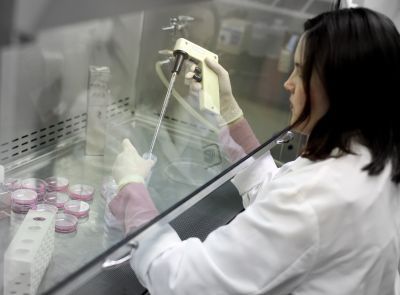IVF treatment linked to higher stillbirth rate: Danish study

Women who undergo in-vitro fertility (IVF) treatment are four times more likely to have a stillbirth compared with those who conceive spontaneously or with a different fertility technique, a Danish study said on Wednesday.
The authors said the causes for the discrepancy were unclear, although they also stressed that, in real terms, the risk of stillbirth among IVF couples was low.
A team led by Kirsten Wisborg of Aarhus University, Denmark, looked at data for 20,166 babies who were born in single births and as first-time pregnancies between 1989 and 2006.
Of these, 82 percent of the infants were conceived within 12 months, which means the couple were classified as fertile.
Ten percent were conceived after more than a year of trying, which falls into the category of sub-fertility.
Four percent were conceived using IVF or a technique called intra cytoplasmic sperm injection (ICSI), which entails injecting a single sperm into an egg.
The other four percent of babies were born to women who had non-IVF or ICSI treatment, such as surgery for a blocked fallopian tube or hormone therapy to restore ovulation.
The risk of stillbirth in women who conceived after IVF/ICSI was 16.2 per thousand; in women who conceived after non-IVF treatment it was 2.3 percent; in fertile and sub-fertile women, the risk was 3.7 and 5.4 per thousand respectively.
When Wisborg factored in maternal age, smoking habits, alcohol and coffee use and other components that could skew data, she found there was a fourfold increase in risk among women who conceived through IVF or ICSI.
There was no difference in stillbirth risk among fertile couples, sub-fertile couples and women who had conceived through non-IVF/ICSI treatment.
"This may indicate that the increased risk of stillbirth is not explained by infertility and may be due to other, as yet unexplained factors, such as the technology involved in IVF/ICSI or some physiological differences in the couples that require IVF/ICSI," said Wisborg.
The study is published in Human Reproduction, a journal of the European Society of Human Reproduction and Embryology (ESHRE).
The findings were contested by Swedish researchers, who said they had found no such link in a larger study involving 31,850 babies born in Sweden.
"I don't know why the two studies should have such different findings, but couples should be reassured that the risk of stillbirths is low," said Karl Nygren, associate professor at Stockholm's Sofiahammet Hospital.
Nygren added that the risk of problems was far lower in a singleton pregnancy compared with multiple pregnancies when IVF was used.
Previous research say there is a much higher risk of pregnancy complications, birth abnormalities and underweight babies when IVF doctors implant multiple embryos.
ri/mh/har
Subscribe to Independent Premium to bookmark this article
Want to bookmark your favourite articles and stories to read or reference later? Start your Independent Premium subscription today.

Join our commenting forum
Join thought-provoking conversations, follow other Independent readers and see their replies